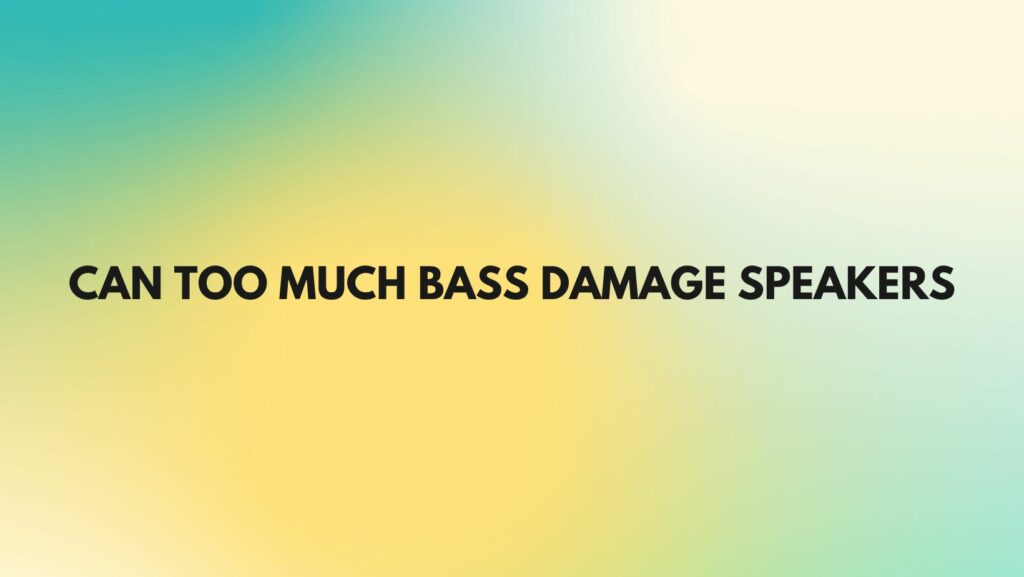Speakers are essential components of audio systems, delivering the full range of sound frequencies to create an immersive listening experience. While bass is a vital part of this experience, there’s a common question among audio enthusiasts: Can too much bass damage speakers? In this comprehensive article, we will delve into the potential risks, factors involved, and precautions you can take to protect your valuable audio equipment.
I. Understanding Bass
Before we discuss whether excessive bass can harm speakers, it’s crucial to comprehend what bass is. Bass refers to the low-frequency sounds in the audio spectrum, typically spanning from 20Hz to 250Hz. It provides the foundation and depth to music, making it more engaging and powerful.
II. Risks of Excessive Bass on Speakers
- Overexcursion: One of the primary risks of excessive bass is overexcursion. When speakers are subjected to extremely low frequencies at high volumes, the diaphragm or cone may move beyond its intended limits, causing physical damage to the speaker.
- Distortion: Excessive bass, when pushed to extreme levels, can lead to distortion in the sound output. Distorted audio not only compromises the listening experience but can also harm the speakers over time. Prolonged exposure to distorted sound may result in permanent damage to the speaker diaphragms and voice coils.
- Thermal Overload: Speakers generate heat when operating at high volumes or for extended periods. If the voice coil or other internal components get too hot, it can lead to damage, ultimately affecting the speaker’s performance.
- Overpowering: Using an amplifier that provides more power than the speakers can handle may result in overpowering. This can cause overexcursion, overheating, and potential damage to the speakers.
- Enclosure Mismatch: Speakers are designed to work optimally in specific types of enclosures, such as sealed, ported, or horn-loaded boxes. Using the wrong type of enclosure can affect the speaker’s performance and potentially lead to damage.
III. Precautions to Protect Your Speakers
To ensure the longevity of your speakers while enjoying powerful bass, consider the following precautions:
- Use Compatible Components: Ensure that your speakers, amplifier, and audio system components are compatible. Match power ratings, impedance, and make sure the speakers are suited for the enclosure you are using.
- Set Volume Limits: Avoid pushing your audio system to its limits for extended periods. Maintaining a reasonable listening level can prevent distortion, thermal overload, and potential damage to your speakers.
- High-Pass Filters: Implement high-pass filters in your audio system to block extremely low frequencies from reaching your speakers. This can help prevent overexcursion and distortion.
- Monitor Temperature: Pay attention to the operating temperature of your speakers. If they feel excessively hot, it’s time to lower the volume or take a break to avoid thermal damage.
- Regular Inspection: Periodically check your speakers for visible damage, such as tears or cracks in the diaphragms and voice coils. Address any issues promptly to prevent further damage.
- Upgrade Cables: High-quality, appropriately sized cables can improve power delivery, reduce resistance, and ensure that your speakers receive the correct amount of power, decreasing the risk of overpowering.
- Follow Manufacturer Recommendations: Always adhere to the manufacturer’s guidelines and recommendations for setup, power levels, and usage as provided in the user manual.
Conclusion
Excessive bass can be an exciting addition to your audio system, but it does come with potential risks for your speakers. By understanding these risks and taking the appropriate precautions, you can enjoy powerful bass without worrying about damaging your speakers. A well-maintained audio system can provide years of enjoyment and a superb listening experience, making it a valuable investment for audio enthusiasts and music lovers.


